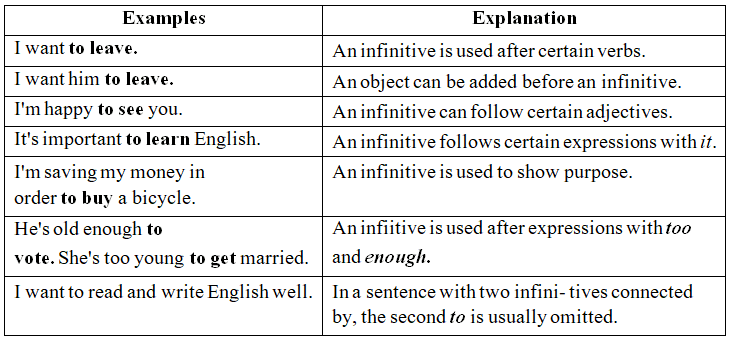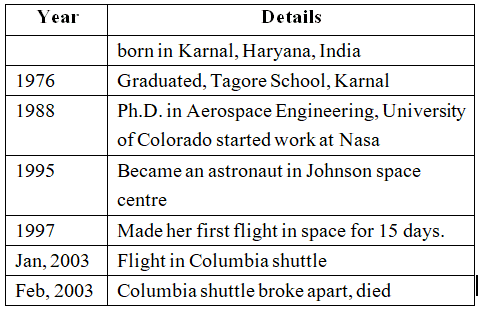Bihar Board Class 8 English Part III Chapter 14. She Lived Her Dream Text Book Questions and Answers
14. She Lived Her Dream
TEXTBOOK QUESTIONS AND THEIR ANSWERS
B. LET’S COMPREHEND :
B.1. THINK AND TELL :
Q. 1. Why did Kalpana Chawla never return from the space?
Ans. Kalpana Chawla never returned from the space as the space shuttle in which she was returning broke apart and she died.
Q. 2. What did Kalpana like to do as a child?
Ans. Kalpana liked to sketch airplanes and loved skies and space.
Q. 3. Who was Jean Pierre Harrison?
Ans. Jean Pierre Harrsion was a French flying instructor and aviation writer who was married with Kalpana Chawla.
Q. 4. When did Kalpana make her first flight in the space?
Ans. Kalpana made her first flight on 19 November 1997.
Q. 5. What did Kalpana and her husband like to do?
Ans. Kalpana and her husband liked aerial aerobatics, hiking, back packing and reading.
Q. 6. What made Kalapna an unusual child ?
Ans. Kalpana’s love for the skies and space made her an unusual child. Teachers always found her sketching airplanes instead of playing with her friends.
B.2. THINK AND WRITE :
B.2.1. Answer the following questions :
Q. 1. “Many hoped for a miracle” (para 1). What miracle could have happened?
Ans. At the return of Kalpana from space, people thought to have some mysterious things to be brought about with her from the space as a miracle.
Q. 2. How was Kalpana different from the other children of her age group?
Ans. Kalpana had a dream about stars, planets and the outer space. She did not like to play with her friends. She was always busy in sketching airplanes. Thus, she was different from the other children of her age.
Q. 3. Which fact of Kalpana’s career shows that she had the qualities of an astronaut? Pick out the line that conveys this.
Ans. Kalpana Chawla became one of the 19 persons selected from 2062 applicants to become an astronaut.
Q. 4. What was Kalpana’s greatest achievement before she died?
Ans. Kalpana Chawla made her first flight in an American space shuttle in 1997 for fifteen days. She moved round the earth in only 90 minutes. She also travelled over 6.5 million miles in space and in 252 orbits after spending a month in the space before she died.
Q. 5. List the activities of Kalpana that show that she loved her country.
Ans. Kalpana paid every year for the trip of two tallented children from her town to visit NASA. She also paid for the education of many girls, too.
Q. 6. List two instances from, the lesson when Kalpana managed to win over her parents. What do they show about Kalpana’s character ?
Ans. Kalpana’s father did not want her to choose flying as a career but she managed to win over him. Her parents did not want her to go to the US for postgraduate studies but she won again. These steps should strong will to do something extraordinary.
C. WORD STUDY:
C.1. Pick out words/expressions from the text that mean the following and use them in your own sentences to make the meaning clear:
Start living in one place (para 3),
fell into pieces (para 1),
convinced (para 2)
journey by air (para 5),
every year (para 6)
Ans. Start living in one place–settle down
fell into pieces–broke apart
convinced–managed
journey by air–flight
every year–annually
Use of the words in own sentences to make the meaning clear:
Settle down–He got married and settled down in America.
Broke apart–There was an explosion in the aeroplane and it broke apart above the ground.
Managed–We managed to get leave from the teacher.
Flight–The fearful bird had his first successful flight.
Annually– Our school celebrated the function annually.
D. GRAMMAR :
Use of ‘have to’ as a modal verb.
There are many verbs which are used as modal verbs-may, can, will, etc. You may have already learnt how to use some of the modal verbs. In this lesson, we will learn the use of ‘have to’ in English.
‘have to’ is used to mean that something is necessary. It can be used in all tenses. It is used in the following way in affirmative sentences:
subject + modal (have to / has to) + verb
I have to wash my clothes today.
He has to write a report.
She had to go to the bank yesterday.
In affirmative statements, ‘have to’ and ‘must’ have a similar meaning. In negative statements, ‘must not’ and ‘not have to’ are very different ‘must not’ expresses prohibition or strong obligation. and ‘not have to’ gives the sense of ‘not necessary’, ‘not required’, or ‘not expected’.
You must not cheat on a test.
I must not eat chocolate. It’s bad for my teeth.
You don’t have to buy a guide book.
We don’t have to spend any money to enter the museum.
You don’t have to come if you don’t want to.
In negative statements, we follow this rule:
Subject + don’t/doesn’t have to + Verb
Example: We don’t have to work tomorrow. He doesn’t have to wear a uniform to schoo!.
D.1.Use the correct forms of ‘have to’ with the verbs given in brackets to complete the sentences.
(i) Do you …… late tonight? (work)
(ii) Anwesha …… a letter to Ananya. (Write)
(iii) Where do you …… your work? (do)
(iv) Anshu …….. hard to pass the exam. (work)
(v) Did you …….. long for Ashu ? (wait)
(vi) He…….. this chapter before test. (read)
(vii) I …….. early yesterday. (get up)
(viii) Aslam may …….. Delhi next week. (visit)
Ans.
(i) have to work
(ii) has to write
(iii) have to do
(iv) has to work
(v) have to wait,
(vi) has to read
(vii) had to get up
(viii) have to visit
D.2. Choose the correct alternative.
(i) Ayesha says she will must/will have to finish her homework by tomorrow.
(ii) Anshu’s phone line is engaged, he has to/must be talking to his mother.
(iii) My mother told me I will not have to/must not forget to buy some bread.
(iv) Ashu is in a hurry with his work; he must/has to give the report by tomorrow morning.
(v) You must/will have to buy something to get a free gift.
(vi) I can’t hear Abhinav any more, he has to be/must be asleep.
(vii) Anita’s watch is not working; she must/will have to buy a new one.
(viii) The TV has been repaired, we must not/don’t have to buy a new one.
(ix) You will have to/must stop when the traffic light is red.
(x) You will have to/must work hard if he wants to pass his exam.
Ans.
(i) will have to, (ii) must be,
(iii) must not, (iv) has to,
(v) will have to, (vi) must be,
(vii) will have to, (viii) must not,
(ix) must, (x) must.
Infinitives:
Look at these sentences : people were planning to celebrate her return. ……. It was to land in Florida.
The underlined words are called infinitives. Find out some more sentences having infinitives. Now have more examples and explanations of infinitives in. the table below :


The following verbs can be followed by an infinitive:
agree forget offer
appear hate plan
attempt hope prefer
begin intend prepare
can/can’t afford know how pretend
choose learn promise
continue like seem
decide love start
deserve manage try
expect need want
wish would like refuse
D.3. Find out at least four examples of infinitives used in the lesson.
Ans. to return, to celebrate, to land, to win.
D.4. Fill in the blanks with an infinitive.
Example : I like to eat samosa
1. I don’t like…….. but I have to it anyway.
2. I can’t afford ………
3. I’ve decide ……..
4. I want ….. but I don’t have enough time.
5. I don’t want ……… but I have to do it.
6. I Sometimes forget
7. I love ………
8. I need ……… and ……… every day.
9. I don’t know how ……… but I would like to learn.
10. I would like ………
Ans. 1. to buy a pen, 2. the expense of a car, 3. to go to Delhi, 4. to help him, 5. to sell my book, 6. to go there, 7. to serve the country, 8. to read, write, 9. to swim, 10. to help.
D.5. Fill in the blanks with the passive of the verb in brackets.
Example : She has to be told (tell) the truth about her friend’s illness.
1. Children have………. (teach) right from wrong.
2. He has ………. (take) to the doctor immediately.
3. Children need ………. (give) love.
4. It is important ………. (respect) by our friends.
5. Anuj doesn’t want ………. (see) in that dress.
6. She is too young ………. (permit) to drive.
Ans. 1. to be taught, 2. to be taken, 3. to be given, 4. to be respected, 5. to be seen, 6. to be permitted.
E. LET’S TALK:
E.1. Talking about the daily routine :
Give each student a card with time written on it for the whole day. The teacher asks questions like ‘What did you do yesterday at 6:00 am ?’ The student should write the answer in the past tense from; e.g., Woke up’ against the time-mentioned. The teacher continues to ask questions and the students complete writing their daily routine on the card.
Now each student can talk about their daily routine, with the help of the activity they have done, the whole day or he/she did yesterday at a particular time of the day.”
Hint: (To be done by the students).
F. LET’S WRITE :
Q. Read the following table. It gives you some information about the famous astronaut Kalpana Chawala.

With the help of the information given in the table, write a brief account of Kalpana Chawala.
Ans. Kalpana Chawla a Brief Account
Kalpana Chawla was born in a town Karnal in Haryana of India. She was fond of aviation from her child life. She studied at Tagore School in Karnal. She graduated in 1976. She achieved Ph-D in Aerospace Engineering from the University of Colorando and started work at NASA. In 1995 she became an astronaut in Johnson space centre. In 1997 she made her frist flight in space for 15 days. In Jan. 2003 she joined her second flight in Columbia Shuttle. During return the shuttle broke apart and she died.
G. TRANSLATION:
कल्पना चावला हमारे देश की बालक-बालिकाओं के लिए प्रेरणा का स्रोत है । आज बहुत-से बच्चे बड़े होकर उसके जैसे अंतरिक्ष की यात्रा करना चाहते हैं । हमें उनका उत्साह बढ़ाना चाहिए । ऐसे बच्चे हमारे देश की शान हैं । विद्यालय के बच्चों में अंतरिक्ष के प्रति रुचि पैदा करना हमारा कर्तव्य हैं ।
Ans. Kalpana Chawla is the source of inspiration for the boys and girls of our country. Today many children being grown up want to travel in space like her. We should encourage them. Such a child is the pride of our country. It is our duty to create interest in school children towards space.
SOME OTHER IMPORTANT QUESTIONS WITH ANSWERS
Q. 1. Who was Kalpana Chawla ?
Ans. Kalpana Chawla was an astronaut born in Karnal, India.
Q. 2. Do you know that Kalpana Chawla lived her dream? How?
Ans. Yes, Kalpana Chawla lived her dream. From her very child life she had her dream to fly in the sky and she fulfilled her desire by being an astronaut and making her flight in space.
Q. 3. Why does the government of Tamilnadu give Kalpana Chawla Award ?
Ans. The government of Tamilnadu gives Kalpala Chawla Award for her bravery and service.
Read more – Click here
YouTube Video – Click here
Leave a Reply